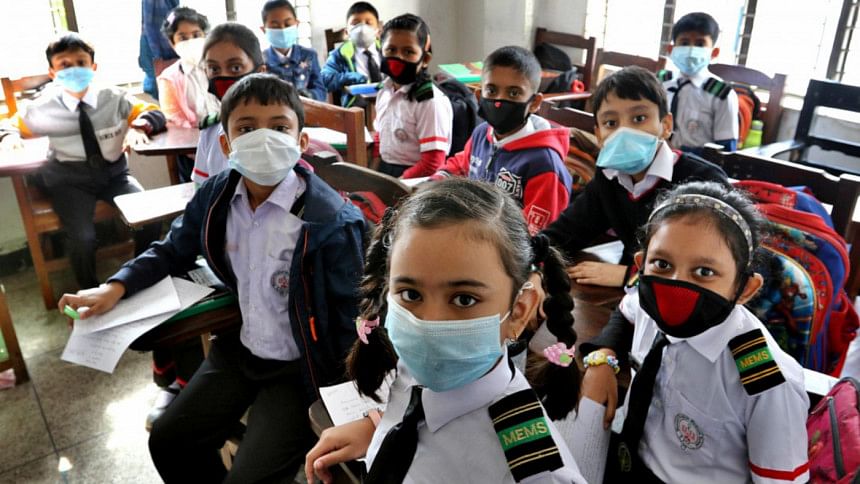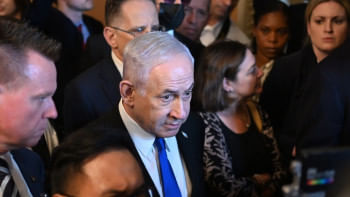Managing schools, learning and student wellbeing during Covid-19

Schools throughout the country, with some 3.7 million students and over a million teachers, are closed due to the coronavirus pandemic. The ongoing shutdown is likely to continue beyond the approaching Ramadan until the end of May. So what can we say about the millions of students, their learning and their wellbeing?
A BRAC survey of 2,675 households in 64 districts using the network of microcredit groups, carried out between March 31 and April 6, shows that the average monthly income of the sample households has dwindled from Tk 14,599 to Tk 3,742. The bread-earners of these families include rickshaw pullers, factory workers, hotel or restaurant workers, and non-farm day labourers, many of whose income has been reduced to zero. Fourteen percent of the low-income families have no fund left and no job to earn any income. Children from these families are also in school, thanks to the expansion of access to school education.
As part of its relief and support measures, the government has announced a plan to provide a monthly cash aid of Tk 2,000-3,000 to each of 3.4 million families. Cash will be sent out starting from April for three months through mobile fund transfer. Economists argue that at least ten million families need this support to survive through the crisis. Many fear that hunger, not the coronavirus, will kill them.
The school education authorities have so far responded in two ways. They have started broadcasting via TV subject-wise lessons for primary and secondary schools, using the spare BTV channel designated for broadcasting national parliament proceedings. Secondly, being concerned about the disruption of the school calendar, they have suggested some changes in the public and school-based exam schedule.
The education responses to the coronavirus have laid bare the deep-seated problems and shortcomings of our education system. The TV broadcast of lessons, though well-intentioned, are largely ineffective. Half of the children do not have a TV at home, according to a BBS/Unicef survey in 2019. The channel used (Shangshad TV) does not cover many parts of the country. Watching a sample of the lessons, both for primary and secondary school subjects, showed that these were an imitation of the usual classroom lectures—a teacher standing by the blackboard and giving lectures to the students, often with poorly presented visuals.
Watching a sample of the lessons also revealed a deeper problem of the content of learning and the pedagogy practiced in our schools. Very often it is merely a listing of or narrative about factual information that students are encouraged to memorise, rather than an incentive to think, raise questions and figure out answers. Basic facts, terminologies and definitions are important for understanding a subject, but it cannot be just factual information without a sense of how these relate to each other, and how they are useful to solve a problem or answer a question.
The uncertainty about how the coronavirus rampage will play out in Bangladesh and other poor countries causes deep anxiety. Is the trajectory likely to be different from that of Europe and the USA? If not, we will be in deeper trouble in two to four weeks. Children feel this anxiety as they are urged to remain confined in their homes; as they see neighbours, friends and relatives infected and even dying; and as more districts and localities come under lockdown. There are reports of increased violence against women and children in families arising from heightened tension and anxieties. All this arguably is a snapshot of the life experience of families who are poor and disadvantaged in other ways, but now it is magnified many times by the coronavirus devastation.
The ideas about re-arranging exam and admission schedules betray a sense that the temporary disruption will be over and we can soon go back to the normal routine. The assessment of student learning and public exams has always been problematic and a subject of much discussion among education researchers and experts. But there is resistance to change from inertia or just fear of change.
One may recall that a review committee, comprising education experts and academics, was appointed by the Ministry of Education in 2017. It was asked to advise the ministry about enhancing school curriculum relevance and effectiveness and making assessment of learning to support better learning experience. Among other recommendations, the committee proposed that the public exams be simplified and shortened to include, for grade 10 (SSC), single papers on Bangla, English, science and social studies, completing the examination in four two-hour sessions. Also for grade 12 (HSC), the suggestion was that there could be additional single papers for science, social science and business subjects. It recommended that school-based evaluation should be relied on for other curricular and co-curricular contents.
Similarly, it was suggested that basic competencies in languages, math and science could be tested with a combined one paper for each subject in grade 5 and grade 8 public examinations; school-based evaluation should be used for regular school subjects and co-curricular learning.
However, bureaucratic inertia and change in the ministry leadership prevented any action on the expert recommendations. The reforms proposed, including some curricular restructuring suggestions, should still be considered following further consultation. But the basic ideas regarding simplifying public exams can be considered as an urgent response under the current extraordinary circumstances.
In the short term, for 2020-21, in view of the current situation and its ripple effects over the next several months, the following four steps are proposed: 1) Announcement should be made now that the 2020 HSC and equivalent examinations would be held when the emergency is lifted, but the timetable would be shortened by having tests with one 100 marks combined paper for each of the languages and math and also one combined paper for each of the science, social science and business subjects; 2) A similar shortened timetable and simplified testing should be announced for the next round of SSC, JSC, PECE and equivalent examinations; 3) The terminal examinations in schools should be cancelled for this year and instead the time should be used for lost teaching time when the schools reopen; and 4) The education boards should initiate a programme to work with schools to communicate with and counsel grade 9 to 12 students about their academic, health, safety and personal concerns and anxieties. Similar communication with parents and children should be undertaken by DPE at the primary level.
For the longer term, beyond 2020-21, the following suggestions are made for consideration: 1) The shortened and simplified public examinations should be made permanent and complemented by school-based evaluation both at primary and secondary level; 2) A major initiative should be taken for using distance, digital and internet-based learning with attention to connectivity, hardware and software availability, accessibility, and affordability in all institutions for all students and teachers; and 3) Redesigning curricula, textbooks, and supplementary learning material, now characterised by factual information and rote learning, should aim at enabling students to engage in thinking, reasoning, understanding and creativity—supported by teacher preparation, change in learning assessment and use of relevant digital learning content by students and teachers.
A lot has been packed into these proposals. These have to be unpacked and fleshed out to make sense of these and to take necessary action. Let the present crisis be the opportunity for much-needed change in school education.
Dr Manzoor Ahmed is professor emeritus at BRAC University.

 For all latest news, follow The Daily Star's Google News channel.
For all latest news, follow The Daily Star's Google News channel. 



Comments